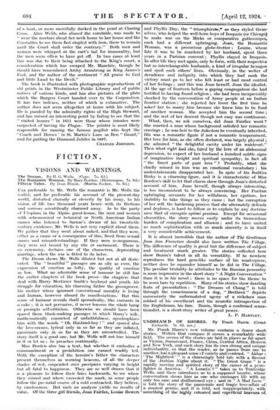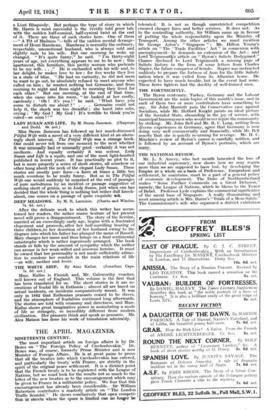Mr. Frank Harris's new volume contains a dozen short , stories.
Within that compass it covers a remarkably wide' field. The scenes of the stories are laid in places as far apart as Vienna, Samarcand, France, China, Central Africa, Heaven. and New York, and each story has its own strong and unique individuality, so that the reader, as he passes from one to another, has a pleasant sense cf variety and contrast. " Akbar : The Mightiest' " is a charmingly told tale with 'a flavour, of the Arabian Nights about it. The Great Game " is a rapidly moving and spirited story of the career of a prize- fighter in America. " A Lunatic ? " takes us to Tunbridge Wells, and there introduces us to a supposed lunatic, whose conversation shows him as one who envisages life with an only too sane and disillusioned eye ; and in A Mad Love " is told the story of the passionate and tragic love-affair of i a musical genius, and it is told, not inappropriately, with something of the highly coloured and superficial bravura of; a Liszt Rhapsody. But perhaps the type of story in which Mr. Harris is most successful is the vividly told genre tale with tbe sudden half-comical, half-cynical twist at the end of it. There are three of such stories here. One of them —" A Fit of Madness "—tells of the sudden mental derange- ment of Henri Flambeau. Flambeau is normally the ordinary, respectable, unemotional husband, who is always cold and slightly rude to his wife. But one morning he woke up changed. " It's quite funny," he said. " I'm thirty-eight years of age, yet everything appears to me to be new • this apartment, this furniture, this pretty woman who pretends to be my wife. . . ." He is enchanted with his wife and, to her delight, he makes love to her : for five weeks they live in a state of bliss. " He had no curiosity, he did not seem to want to go out, he absolutely refused to meet anyone who called on him ; he wanted nothing but Germaine, and from morning to night and froth. night to morning they lived for each other." But one morning, at the end of that time, when she came into his room, " he looked at her coolly, carelessly : Oh I it's you ! ' he said. What have you come to disturb me about ? ' . . . Germaine could not help it, the shock was too dreadful ; she burst into sobs, crying : My God I My God ! It's terrible to think you're cured—so soon 1 ' "











































 Previous page
Previous page